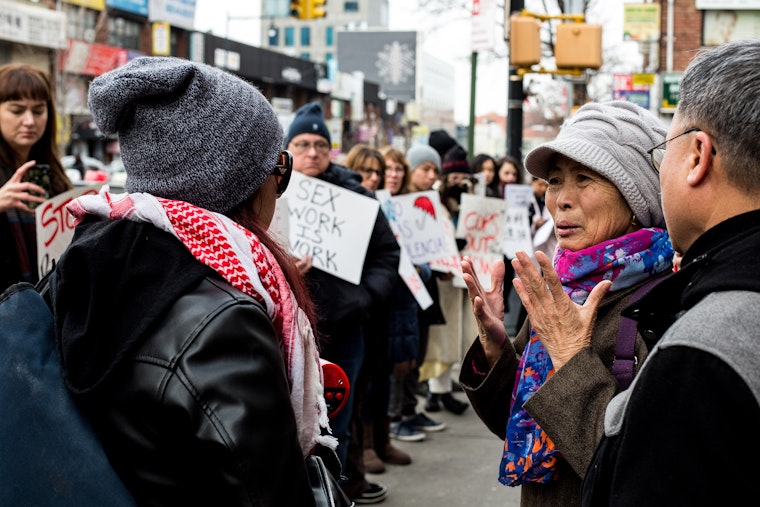Sex Workers Demand Justice
By Julia Lukomnik

Not long ago, protesters gathered outside of New York City’s 109th police precinct in Flushing, Queens. They held signs—written in English, Chinese, and Spanish—which featured slogans such as “Rights, Not Raids” or “No Shame in Working to Survive.” December 17th was the International Day to End Violence Against Sex Workers, and the protest in Queens was just one of dozens around the world where sex workers and their allies spoke out to demand change.
In Queens, however, it was personal. Protesters gathered to demand justice for Yang Song, a green card–holding immigrant from rural China who moved to Queens to earn a living. When her husband was unable to work, she began to sell sex to support her family.
Because her work was illegal, Yang was an easy target for a man who posed as a police officer before threatening and raping her. Despite her fear that talking about her assault could result in arrest, retaliation, or forced rehabilitation, Yang worked up the courage to make a report.
Not long thereafter, though, the New York Police Department raided the massage parlor where Yang worked. Yang, still recovering from her assault at the hands of a man who claimed to be a cop, was understandably terrified. In a desperate attempt to escape the police, Yang jumped out of one of the parlor’s windows. She did not survive the fall.
Yang’s story is a tragic reminder that violence against sex workers is widespread and often goes unpunished. This year in the United States, for example, 31 sex workers—a disproportionate number of them trans women of color—were killed. Internationally, the number was higher still, in the hundreds. But Yang’s story is a reminder of something else, too: that the victimization sex workers endure is an inevitable result of the criminalization of sex work itself.
There’s no question that the intersection of racism, sexism, transphobia, and stigma put sex workers at risk—but laws criminalizing sex work leave them even more vulnerable to abuse. Criminalization isolates sex workers, strands them with potentially dangerous clients, reduces their ability to protect themselves through measures such as working together or doing background checks, and increases their vulnerability to police abuse. It also makes it harder for them to seek justice. Ending violence against sex workers will be impossible so long as they feel justifiably afraid to seek help.
If New York’s policymakers are serious about fixing this broken system, they need to rise to the challenge and embrace two significant reforms. First, they must change the way police officers engage with sex workers. Second, they must finally do what experts, advocates, and sex workers themselves have been urging for years—and decriminalize sex work.
In the first regard, the NYPD’s record leaves much to be desired. There is currently an open class action lawsuit against the department for allegedly harassing women of color, whom officers were allegedly profiling as sex workers. Meanwhile, sex workers are still easy targets for arrest quotas—which is one of the reasons why raids like the one that led to Yang Song’s death are increasing. Instead of targeting sex workers, police should recognize their need for protection, and provide it.
On this score, the NYPD could learn a lot from looking at how some police forces elsewhere in the world handle these issues. After several sex workers in Liverpool, England, were murdered, for example, the local police started treating crimes against sex workers like hate crimes and focused on protecting sex workers instead of arresting them.
The result was a dramatic increase in the conviction rate for rape and other crimes against sex workers. This kind of community policing could go a long way towards reducing the violence many sex workers face.
That said, police reform isn’t enough; New York must decriminalize sex work, too.
As Amnesty International, the United Nations, and the World Health Organization have all recognized, decriminalization is the most effective way to protect the health and human rights of sex workers. It allows for the regulation of sex work under pre-existing labor law (ensuring workers are subject to prevailing health and safety standards) and creates access to social services such as retirement benefits. Decriminalization would also decrease the number of sex workers whose prior arrest records keep them from transitioning to alternative ways of making a living. Last but not least, decriminalizing sex work could help sex workers fight abuse and contact law enforcement without fear of retribution.
Midway through Sunday’s protest, Yang Song’s mother, Yumei Shi, arrived. As activists spoke about New York’s flawed prostitution laws, its poor police oversight and accountability mechanisms, and the victimization of documented and undocumented immigrants, Yumei quietly stood next to a community organizer holding a sign, which read: “Respect Life.”
Slowly, the crowd noticed Yumei and waited for her to speak. Through tears, and with the help of an interpreter, she finally raised her voice. “Justice,” she said. “We want justice.”
Until December 2021, Julia Lukomnik was a senior program officer with the Open Society Public Health Program.


